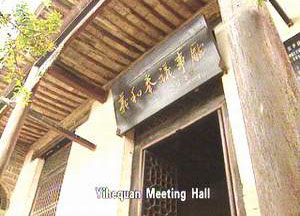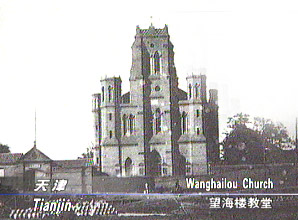 |
|
Troubled Times at the Beginning of the Century (4)
The Yihetuan Movement 
|
|
|
 The practice of martial arts has been popular since ancient times in the area bordering on Shandong and Hebei provinces. The Chinese Plum Flower Boxing has been handed down since the end of the Ming Dynasty more than 300 years ago. The practice of martial arts has been popular since ancient times in the area bordering on Shandong and Hebei provinces. The Chinese Plum Flower Boxing has been handed down since the end of the Ming Dynasty more than 300 years ago.
A hundred years ago, Zhao Sanduo was a famous coach of Chinese Plum Flower Boxing in this area.
In 1896, Zhao Sanduo established his own sect of boxing and called it Yihequan, which literally means Boxing of Righteous Harmony. The name shocked most parts of China in the ensuing years.
In 1898, people at Liyuan Village, Guanxian County, Shandong Province, not far from Shaliuzhai, clashed with the foreign missionaries there, but they were suppressed by the government. Stirred by righteous indignation, a contingent of insurgents led by Zhao Sanduo hurried to Shandong.
Christianity, called a foreign religion by Zhao Sanduo, was introduced into China towards the end of the Ming Dynasty. By 1899, over 2,300 missionaries had recruited more than 800,000 Chinese believers. They included more than 100,000 believers in Shandong and Hebei. When conflicts occurred between believers and non-believers, the missionaries forced local officials to side with the believers, arousing resentment among the non-believers. Towards the end of the Qing Dynasty, missionary cases were frequent and clashes became more and more intense.
The rebellion at Liyuan Village was recorded in the Annals of Weixian County. After the failure of the uprising, Zhao Sanduo and others fled northward along the Grand Canal. Everywhere they recruited followers and set up boxing points. They called for supporting the Qing Dynasty and exterminating the foreigners.
North China suffered a severe drought in 1900. A poster put up by the Yihetuan said , "There is no rain, so the land is dry, because the sky has been blotted out by the churches."
Masses of angry people rose in response, starting the dynamic Yihetuan Movement, known to the West as the Boxers.
The foreign missionaries sought shelter in the face of the uprising spreading like a prairie fire. The conflicts between local people and missionaries led to an international strife. Imperialist powers that had never treated China as an equal decided to carry out armed intervention. They sent reinforcements to China and their warships gathered in the Bohai Bay. On June 7, 1900, the Eight-Power Allied Forces started to invade Beijing.
The armed intervention of foreign troops aroused greater patriotic fervour among the Chinese people. Yihetuan organizations in various parts of the country expanded rapidly. They entered Beijing and Tianjin to put up tough resistance to the Eight-Power Allied Forces with their flesh and blood.
 The Chinese people had been humiliated for half a century. Now they raised angry shouts. The Chinese people had been humiliated for half a century. Now they raised angry shouts.
The tide of struggle against foreign religion turned rapidly into an armed struggle to exterminate foreigners under the banner of the Yihetuan Movement. The tide lasted for 40 years.
In the face of the situation getting out of control, there were different opinions in the imperial court. Empress Dowager Cixi didn't take a clear-cut stand at an imperial cabinet meeting. She only said that the popular feelings could be made use of, expressing her dissatisfaction with imperialist powers that supported Emperor Guangxu.
With tacit consent of the imperial court, the Yihetuan insurgents from various prefectures and counties arrived in Beijing and openly set up their points. Their posters were put up overnight inside and outside the capital. The anti-foreign movement became more and more intense. Christian followers, foreign firms and banks and even Western medicine shops were targets of attack.
Dazhalan was a well-known shopping street in Beijing. On June 16, Yihetuan insurgents set fire to a Western medicine shop. More than 4,000 shops were engulfed in the blazing fire. Buildings outside Zhengyangmen Gate were reduced to ruins.
The spontaneous anti-imperialist patriotic movement was a tragic and stirring prelude to the Chinese people's resistance to foreign aggression in the 20th century.
|
|
|
|
|
|
|
 |









